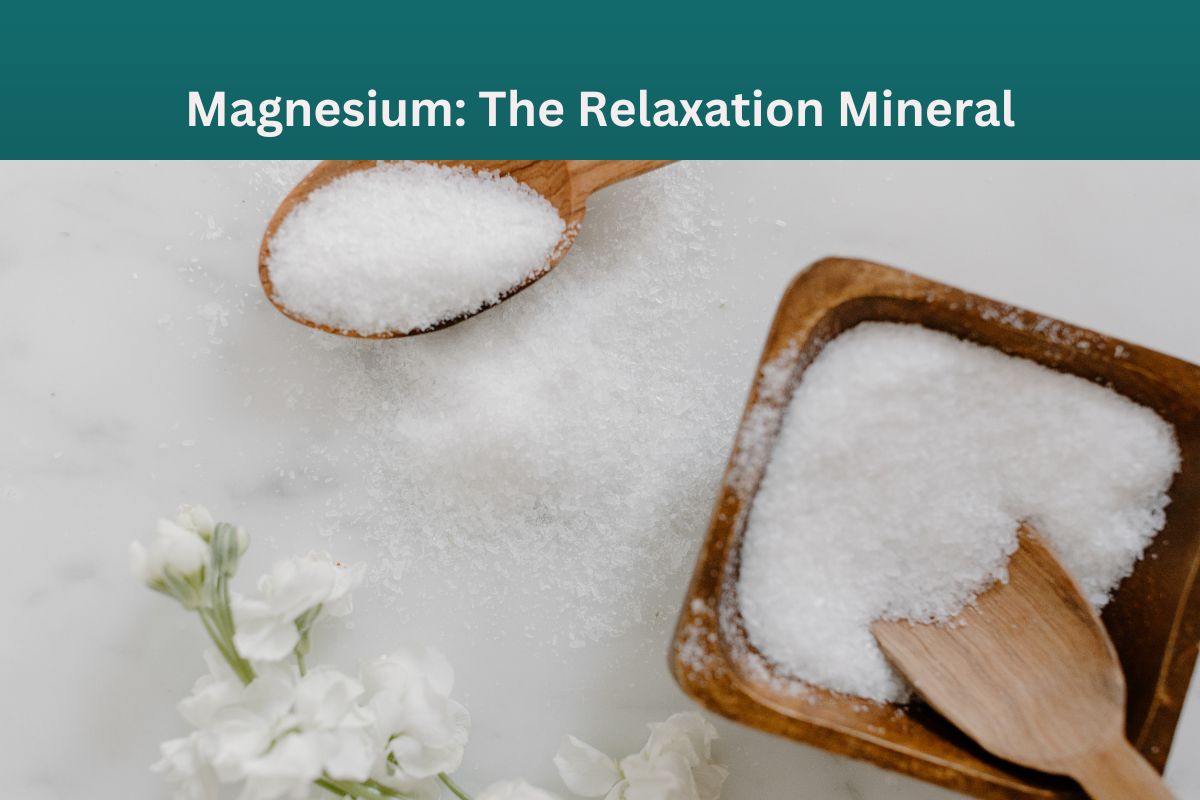Magnesium As The Relaxation Mineral(and more)
This post may contain affiliate links. View our disclosure policy here.
Are you totally relaxed without a care in the world? Do you eat foods grown in super rich naturally nutrient dense soils? Are high amounts of greens included daily in your meals? How about sea vegetables? Do you completely avoid absolutely all sugar and caffeine? No?? Yeah, me neither. In all honesty, if you are not getting these nutrient dense foods from nutrient dense soils (most of us are not), and you ARE taking in average to large amounts of sugar and caffeine, that is all you need to know that you are magnesium deficient as is most of the world population. And magnesium is super important. Important enough to make a priority starting RIGHT NOW. Let’s follow Dr. Mark Hyman’s advice and think of magnesium as the relaxation mineral.
“Think of magnesium as the relaxation mineral. Anything that is tight, irritable, crampy, and stiff – whether it is a body part or even a mood- it is a sign of a magnesium deficiency.”
Mark Hyman, M.D.
As a matter of fact, I myself am increasing my sources and amounts of magnesium that I’m taking each day. Read more to find out why – and how YOU can too!
Magnesium requires a place in your wellness basket!
Magnesium Is A Critical Nutrient
Did you know that magnesium is one of the most abundant minerals on earth, highly abundant in sea water? Even so, almost half of Americans are deficient in this critical nutrient that accounts for a very long list of symptoms and diseases? Let’s talk today about what role magnesium plays in optimal health, why Dr. Hyman refers to it as a relaxation mineral, and how to add more of it to your diet!
Optimal Health with the Relaxation Mineral
Magnesium offers and abundance of benefits. Furthermore, deficiency is linked to disease. For optimal health, magnesium must be included as part of the daily diet and supplementation may need to be considered.
Having a deficiency in magnesium is connected to an astoundingly long list of symptoms and/or diseases. Furthermore, magnesium deficiency may be one of the leading causes of health problems today. This ‘relaxation mineral’ plays a large role in inflammation in the body and is directly connected to a host of diseases. While it doesn’t seem to get the attention from conventional medicine doctors that it deserves, there are, in fact, according to Dr. Mark Hyman, over 3,500 medical references on magnesium deficiency.
In addition to magnesium deficiency being directly related to disease and illness, there is a host of benefits including the following:
- Promotes Bone Health
- Enzymatic Functioning
- Carbohydrate and Sugar Processing
- Relaxation and Contraction of Muscles
- Promotes Heart Health
- Helps Alleviate Depression and Anxiety
- May Assist in Prevention and Alleviation of Migraine Headaches
- Assists in Regulation of Sleep Cycle
Possible Symptoms of Magnesium Deficiency
- Trouble sleeping
- Anxiety/Mood disorders
- Irritability
- Sensitivity to Loud Noises
- ADD
- Physical and Mental Exhaustion
- Muscle Weakness
- Twitching, Tremors, and Muscle Cramps
- Abnormal heartbeat/Palpitations
- Constipation
- Headaches/Migraines
- Fibromyalgia
- Chronic Fatigue
- Asthma
- Kidney Stones
- Diabetes
- Osteoporosis
- High Blood Pressure
- PMS/Menstrual Cramps
- Irribtable Bowel Syndrome
- Reflux
- and more!
*It’s important to note your combination of symptoms when it comes to magnesium deficiency because a serum magnesium level is actually the least sensitive way to know you have low magnesium.
The Relaxation Mineral
As Dr. Hyman states in the quote above, magnesium is required for relaxation. It’s often considered by many when speaking of relaxation. Why? Magnesium has a huge role in promoting relaxation(and more) within the body and reducing the effect of stress within the body. Here’s a few reasons why:
- Muscle Relaxation: Magnesium plays a crucial role in muscle function and relaxation by regulation of the neuromuscular signals that enable your muscles to relax after contraction. Correspondingly, low magnesium levels may contribute to muscle tension and cramping. Adequate magnesium levels promote muscle relaxation.
- Nervous System Regulation: Because magnesium is involved in the regulation of the central nervous system, it helps balance neurotransmitters. This has calming effects on the brain and promotes relaxation. In addition, magnesium supports normal functioning of the parasympathetic nervous system. Responsible for the “rest and digest” response, the parasympathetic nervous system helps counterbalance the effects of the sympathetic nervous system (fight-or-flight response).
- Stress Reduction: Chronic stress depletes magnesium levels in the body. Because magnesium plays a role in regulating the hypothalamic-pituitary-adrenal (HPA) axis, maintaining adequate magnesium levels can help modulate the HPA axis, reducing the release of stress hormones like cortisol and thereby promoting a sense of calm.
- Sleep Support: Magnesium is involved in the regulation of melatonin, the hormone that plays a crucial role in sleep-wake cycles. Because melatonin helps regulate the circadian rhythm, it enables restful sleep. Therefore, when magnesium aids in the production and release of melatonin, it is thereby supporting healthy sleep patterns.
- Mood Stabilization: Magnesium is essential for maintaining healthy brain function. It is involved in the production and release of neurotransmitters that regulate mood, such as serotonin. Adequate magnesium levels can help stabilize mood and reduce symptoms of anxiety and depression.
Magnesium Sources
How to Add Magnesium to Your Wellness Basket
Let’s talk about how to add magnesium to your wellness basket. More importantly, let’s talk about how adding magnesium in more than one way is best! There’s a number of ways to maintain magnesium for optimal health. Some of these ways include food, supplements, sprays, oils and bathing with Epsom Salts. As magnesium has limited bioavailability, deriving your supply from a variety of sources through the day is best.
Foods For Magnesium
Naturally, when it comes to health, I will always suggest whole, quality (organic when possible) foods as your primary source for vitamins and minerals when you are able. These foods are just a few examples of magnesium-rich options. It’s worth noting that the exact magnesium content can vary depending on factors like soil quality, growing conditions, and preparation methods.

- Nuts and Seeds – In particular, hemp seeds, flaxseeds, brazil nuts, sesame seeds, chia seeds, cashews, almonds and pumpkin seeds are quite high in magnesium. Having a handful of nuts each day as a healthy snack option is good for magnesium and a number of other health benefits!
- Dark Chocolate – That’s right! This is good news for chocolate lovers! Dark chocolate with a high cocoa content can provide around 64 mg of magnesium per ounce of chocolate.
- Leafy Greens – Several greens contain high amounts of magnesium as well as many other nutrients! Spinach, Kale, Collard Greens, and Beet Greens are particularly high in magnesium.
- Dandelion Greens- I thought about including these with leafy greens. They certainly qualify. However, I wanted them to stick out on their own because they are often overlooked when people consider leafy greens and they are so beneficial. Check out my post on dandelion!
- Avocado: Avocados contain approximately 58 mg of magnesium per medium-sized fruit! Pretty amazing, huh? Bonus: Did you know avocadoes are one of the healthiest sources of fat you can eat that’s not animal fat?
- Fatty Fish – Many types of fish are high in magnesium, including salmon, mackerel, and halibut. Be careful here though. Some sources of fish are high in toxins. Farmed fish isn’t necessarily so healthy either. My preference is wild-caught Alaskan salmon. It’s expensive, but we try to get this in on a weekly basis here.
- Bananas – Bananas are a great, inexpensive source of a number of nutrients including magnesium. Be careful here too though, the riper the banana the higher the sugar content. Aim for bananas that are just ever so slightly green and without the brown spots.
Other Sources of Magnesium
Magnesium Supplements
There are several different types of magnesium supplements on the market. There is no one answer as to whether you need to supplement with magnesium or other vitamins and minerals. But we know that most people do not get enough magnesium and are deficient in this important relaxation mineral. So it may be in your best interest to investigate the types of magnesium supplements available and work with a functional medicine practitioner to figure out which may be best for you.
Magnesium glycinate is highly bioavailable magnesium and supports the metabolism and utilization of carbohydrates, amino acids and fats for energy. This one available on Amazon is a good quality to try.
I also believe it’s best to have a number of types of magnesium and so I really like this brand, also available on Amazon. It contains two forms of magnesium. More than one source of magnesium and form is best to ensure you are getting what you need.
Be careful of supplements with magnesium citrate if you have a sensitive digestive system resulting in diarrhea. If you have constipation issues, it might be your friend. However, if you have the opposite issues, it’s not your friend!
Also avoid magnesium carbonate, sulfate, gluconate, and oxide especially as a main source. They are poorly absorbed. Unfortunately they tend to be the cheapest and most common forms found in supplements.
Epsom Salts
Adding Epsom salts to your bathwater can be an easy way to get more magnesium. This is a nice additional way to allow your body to absorb magnesium. I actually took an Epsom salt bath last evening and was deeply impressed with how some muscle issues resolved rather quickly in a warm relaxing bath.
Magnesium Lotion/Spray
It is possible to get some of your magnesium transdermally through a spray or lotion. Working with a product like this can be a lovely part of a bedtime routine as it may help your body lull into sleep. A word to the wise: applications of magnesium may sting a bit or tingle. Some people prefer washing it off after ten minutes or so. This is completely optional of course and the tingling, if it occurs, might be an indicator that you are actually deficient (this is a theory though with no proof of evidence that I’m aware of). Although many people do say that over a bit of time (a few days or a week or more) those that have the tingling may experience it less and less. Some people say that different oils or lotions affect them differently in relation to the ‘tingling’.
Precautions:
There’s not a concern for getting too much magnesium from foods. However, it is possible to get too much from supplements and has the potential for causing loose stools or nausea. Also, you should have a conversation with your doctor before supplementing with magnesium if you have severe kidney issues. It’s important to note that while magnesium is associated with relaxation and other things mentioned in this post, individual experiences may vary. This could come from taking the wrong form of magnesium as well. It’s best to discuss what types of supplements are best and how much with your holistic medicine practitioner.
The Relaxation Mineral: Conclusion
Magnesium , the relaxation mineral, is most definitely a critical mineral. We must be very conscientious of eating foods and probably taking supplements to make sure we are getting enough! As you can see, magnesium is essential for relaxation within the body and many other body functions. Add magnesium to your wellness basket today. Try supplements, foods, and a spray, lotion or Epsom salt baths!
Are you currently taking any supplements with magnesium? Which of the Ways To Acquire Magnesium are you going to try?








Very interesting read. I water fast a lot and it is important to balance magnesium, sodium and potassium. I will back track your article next time I am on a fast. Thank you!
Make sure you are getting enough throughout your days when fasting and when not! It will be easier to balance it if you are already getting enough.
Such great info! It’s crazy how many benefits magnesium has
It’s even more crazy how depleted most of us are in it! Hope you find some natural ways to increase your own!